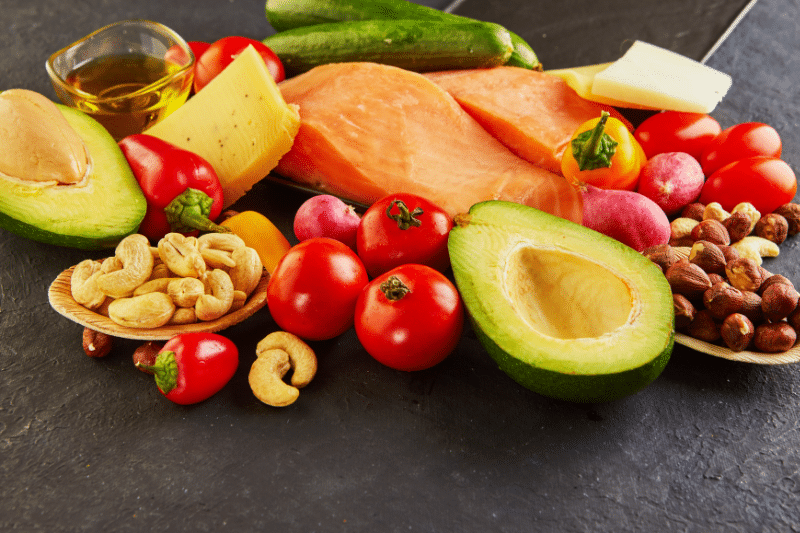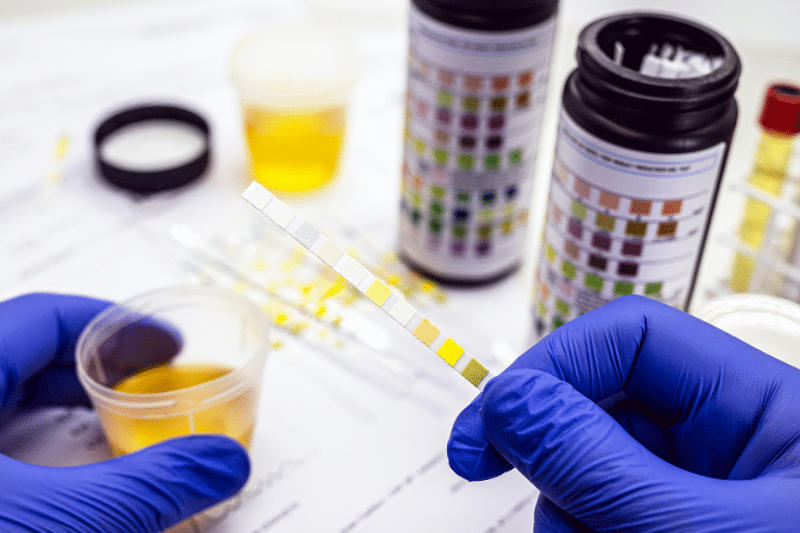Diet Ketosis Overview
Essentially, diet ketosis or ketogenic diet is a low-carb, high-fat eating plan. Particularly designed to shift the body into a state of nutritional ketosis, where it primarily burns fat for energy instead of carbohydrates.
In fact, in nutritional ketosis, the body shifts from using carbohydrates as its primary source of energy to using fat. This metabolic state is achieved by drastically reducing carbohydrate intake, as well as replacing it with saturated fat intake. Explore the step-by-step guide to find out how this metabolic state can help with weight loss and mental clarity. In addition, discover the tips to get your body into a fat-burning state quickly.
What is the Ketogenic Diet Characterized By?
Typically, the ketogenic diet is characterized by its macronutrient composition. Such as high fat, moderate protein, and very low carbohydrates. Typically, the standard ketogenic diet may consist of about 70-80% fat, 15-20% protein, and only 5-10% carbohydrates. Furthermore, this unique ratio helps the body to enter ketosis and begin burning fat for fuel.
What Does the Term “Keto” Mean?
The term “keto” comes from “ketosis,” the metabolic state that the diet aims to induce. In ketosis, the liver produces ketones, which are molecules created from fatty acids when blood glucose alone is not available. Furthermore, these ketones serve as an alternative energy source for the brain and body.
What is the Main Focus of the Keto Diet?
The main focus of the keto diet is to shift the body’s metabolism from burning carbohydrates to burning fats. By restricting carbohydrates to a minimum, the body is encouraged to use fat as its primary energy and main source of energy. Moreover, this shift can lead to weight loss and improved energy levels for many people.
What is the Keto Diet For?
The keto diet is for weight loss and improving metabolic health. It offers numerous health benefits, such as weight loss, improved insulin sensitivity, and the potential to manage or prevent certain diseases. It can also be used for managing conditions like epilepsy, type 2 diabetes, and polycystic ovary syndrome (PCOS). Some people use it for mental clarity and energy.
Furthermore, how the keto diet works is understanding the core: drastically cutting carbs to get into ketosis, a state where the body burns fat for fuel. By eating high fat moderate protein and very low carbs the keto diet works, carbs the body switches from glucose to ketones.

Diet Ketosis – Health and Safety
Is it good for your body to be in ketosis?
Being in ketosis is good for many people for weight loss and managing certain health conditions. Research shows ketosis can lead to weight loss, reduced appetite, and better blood sugar control.
But you should approach the diet with caution and under medical supervision especially if you have underlying health conditions.
How long is it safe to be in ketosis?
How long is it safe to be in ketosis? The answer varies from person to person. Short-term ketosis is generally safe for most people. Research shows staying in ketosis for several months to a year is safe and effective for weight and metabolic health.
But long-term effects and safety are still being studied and it’s best to consult with a doctor to make sure ketosis is right for your health.
How Does a Ketogenic Diet Work?
A ketogenic diet works by reducing the intake of carbohydrates to a level where the body is forced to rely on fat for energy. Additionally, this process begins after the body has depleted its stores of glucose and glycogen, the primary energy sources from carbohydrates.
Are Keto Diets Good For You?
Keto diets can be good for you if done right. They include a low-carb diet high-fat diet along with nutrient-dense foods like avocados, nuts, seeds, and lean proteins. But with the high fat content you need to focus on healthy fats not processed or saturated fats.
Hence make sure you get your vitamins and minerals from nonstarchy vegetables and supplements to avoid nutrient deficiencies.
Is Keto Good For Weight Loss?
Yes, the keto diet is used for weight loss. Not only reducing carbs but also increasing fat. Eventually, the body burns stored fat for energy and you can lose a lot of weight. Many people find the keto diet works for body weight reduction, loss, and body composition especially when combined with regular exercise.
Is Keto Good or Bad?
The keto diet has pros and cons. On one hand, it can lead to weight and fat loss, blood sugar control, and mental clarity for some. On the flip side nutrient deficiencies, digestive issues, and the keto flu during the adaptation phase. As a matter of fact, you need to monitor the diet and adjust as needed.
Is Keto A Healthy Diet?
When done right the keto diet can be a healthy option for many. It promotes whole unprocessed foods and healthy fats. But because it’s a restrictive diet you need to make sure you’re getting all the nutrients. Nonetheless, regular monitoring with a healthcare provider can help address any issues that arise and ensure long-term health and well-being.

Diet Ketosis – Food Guidelines
What Do You Eat on a Keto Diet?
On a keto diet, you eat:
-
Meat and Fatty Fish – Beef, chicken, salmon, and mackerel.
-
High-Fat Dairy – Cheese, butter, and heavy cream.
-
Healthy Fats – Olive oil, coconut oil, and avocado oil.
-
Nuts and Seeds – Almonds, walnuts, chia seeds, and flaxseeds.
-
Low-carb Vegetables – Leafy greens, broccoli, cauliflower, and bell peppers.
What are the Basic Rules of a Keto Diet?
The basic rules of a keto diet are:
Limit Carbs
Eat a low-carb diet, less than 20-50g of net carbs a day.
Increase Fat
Aim for fats to make up 70-80% of your daily calories.
Moderate Protein
Keep protein moderate, 15-20% of your daily calories.
Whole Foods
Eat a low-fat diet of whole, unprocessed foods and avoid sugar and grains.
What Can’t You Eat on a Keto?
Foods you can’t eat on a keto diet:
-
Sugar – Candy, cakes, and sugary drinks.
-
Grains and Starches – Bread, pasta, rice, and cereals.
-
High-carb Fruits – Bananas, apples, oranges, and grapes.
-
Certain Root Vegetables – Potatoes, corn, and peas.

What Are the Top 10 Keto Foods?
-
Avocados.
-
Eggs.
-
Salmon.
-
Nuts and Seeds.
-
Olive Oil.
-
Leafy Greens.
-
Cheese.
-
Coconut oil.
-
Butter.
-
Cauliflower.
What Foods Are in a Keto Diet?
Foods particularly included in a keto diet are primarily high in saturated fat, and low in carbohydrates. This includes:
-
Meats and Seafood.
-
Low-carb Vegetables.
-
High-fat Dairy Products.
-
Nuts and Seeds.
-
Healthy Oils and Fats.
What Is the Rule for the Keto Diet?
The main rule for a keto diet is to up protein consumption and keep carbohydrate intake very low while increasing body fat percentage and intake. Consequently, this creates a state of ketosis where the body burns fat for fuel.
What Are the Basic Rules for Keto?
Basic rules for the keto diet include:
- Stay Low-Carb – Limit daily carb intake to 20-50 grams.
- High Fat – Ensure fats make up 70-80% of your daily caloric intake.
- Moderate Protein – Keep protein intake moderate to avoid disrupting ketosis.
- Whole Foods – Focus on unprocessed, nutrient-dense foods.

Detecting and Monitoring Ketosis
How Do You Know When Your Body Is in Ketosis?
The best ways to determine if your body is in ketosis at home through several methods:
Ketone Urine Strips
Measure ketone levels in urine. Simple and affordable, though less precise.
Breath Meters
Detect acetone levels in the breath. Non-invasive and easy to use.
Blood Ketone Meters
Provide the most accurate measurement of blood ketone levels. Most accurate but can be costly.
How Can You Tell If You’re in Ketosis?
Signs that you are in ketosis may include:
- Increased Thirst – Higher ketone levels may lead to more frequent thirst.
- Bad Breath – A distinct fruity smell may indicate ketosis.
- Weight Loss – Rapid weight loss can be a sign of ketosis.
- Reduced Appetite – Many people experience decreased hunger.
Diet Ketosis – Benefits and Goals
Is Ketosis a Good Diet?
Ketosis can be a beneficial diet for many people, particularly for weight loss and managing blood sugar levels. Subsequently, it can also lead to improved mental clarity. As well as increased energy levels. However, individual results may vary, and it is important to follow the diet carefully to avoid potential pitfalls.
What Is the Main Focus of the Keto Diet?
The main focus of the keto diet is to induce ketosis by significantly reducing carbohydrate intake.
What Is Keto Diet Meant For?
The keto diet is meant for:
- Weight Loss – By burning fat for energy.
- Blood Sugar Management – For those with type 2 diabetes.
- Mental Clarity – Many report enhanced focus and cognitive function.
- Medical Conditions – Such as epilepsy and PCOS.

Keto Low Carb Diets FAQs
How Accurate Are Keto Urine Test Strips?
Keto urine test strips are reasonably accurate for detecting the presence of ketones but can be less reliable over time as the body adapts to ketosis. Moreover, they are best used in the early stages of the diet to monitor ketone levels.
What Is the Difference Between Keto and Atkins Diets?
The keto and Atkins diets both focus on low carbohydrate intake but differ in their approaches. The modified Atkins diet (MAD) is a variation of the Atkins diet that provides a structured approach to carbohydrate restriction and is particularly beneficial for individuals with epilepsy.
While, the keto diet maintains a strict macronutrient ratio to stay in ketosis. Whereas the Atkins diet allows for a gradual increase in carbohydrates as you progress through its phases.
Are There Different Types of Keto Diets?
Yes, there are several other diets and variations of the keto diet, including:
Standard Keto Diet (SKD)
High fat, moderate protein, and very low carbs.
Targeted Keto Diet (TKD)
Allows for carb intake around workouts.
Cyclical Keto Diet (CKD)
Includes periods of higher-carb intake.
High-Protein Keto Diet
Similar to SKD but with higher protein.

Ketogenic Diets and Exercise
How Does the Keto Diet Affect Exercise Performance?
Initially, exercise performance may decline as the body adapts to ketosis. However, many people experience improved endurance and energy levels once fully adapted. Similarly, it’s important to monitor your performance and adjust your diet and exercise routine as needed.
Can You Build Muscle on a Keto Diet?
Yes, you can build muscle on a very low carb diet full-fat, keto diet. However, it may require careful attention to protein intake and resistance training. Many individuals find that with the right approach, muscle gain is achievable while in ketosis.
What Are Common Side Effects of Starting a Keto Diet?
Common side effects, often referred to as “keto flu,” include:
-
Headaches.
-
Fatigue.
-
Nausea.
-
Dizziness.
How Can You Manage Keto Flu Symptoms?
To manage keto flu symptoms, try:
-
Staying Hydrated – Drink plenty of water and consider electrolyte supplements.
-
Gradual Transition – Slowly reduce carbs instead of making drastic changes.
-
Eating Enough Fat – Ensure you’re consuming adequate fats to support your energy needs.
Can the Keto Diet Help with Epilepsy?
Yes, the keto diet is effective in managing epilepsy, particularly in reducing the frequency and severity of seizures in drug-resistant epilepsy cases. Similarly, it is often used as part of a comprehensive treatment plan under medical supervision.
Is the Keto Diet Recommended for Diabetes Management?
The keto diet can be beneficial for managing type 2 diabetes by using insulin sensitivity improving blood sugar control and reducing insulin resistance. However, it is essential to work closely with a healthcare provider to tailor the diet to individual needs and monitor both blood pressure and sugar levels.
By following these guidelines, individuals can effectively navigate the keto diet and work towards achieving ketosis. However, individual experiences may vary.
Nonetheless, a ketogenic diet or low-carb diet can be a highly effective way to lose weight and improve your overall health. Regardless, it’s not for everyone, and it’s essential to consult with a healthcare professional before starting a ketogenic diet.
However, with the right guidance and support, you can achieve a state of ketosis and enjoy the many benefits of a ketogenic diet. Therefore it is always advisable to consult with a healthcare professional before making significant dietary changes.











